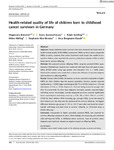2021-06-22Zeitschriftenartikel
Health‐related quality of life of children born to childhood cancer survivors in Germany
Balcerek, Magdalena
Sommerhäuser, Greta
Schilling, Ralph
Hölling, Heike
Klco‐Brosius, Stephanie
Borgmann‐Staudt, Anja
Objective:
Rising childhood cancer survival rates have increased the importance of health-related quality of life (HRQL) assessment. While survivors show comparable HRQL to peers, concerns that cancer treatment could impact the health of prospective children were reported. No previous publications address HRQL of childhood cancer survivor offspring.
Methods:
We assessed survivor offspring HRQL using the parental KINDL questionnaire. Matched-pair analysis was conducted with data from the general population (KiGGS study) using age, gender and education (1:1, n = 1206 cases). Multivariate analyses were conducted to detect the influence of parental diagnose and treatment on offspring HRQL.
Results:
Overall, within KINDL dimensions, survivors reported comparable to higher HRQL for their children than the general population. Survivor parents reported significantly (p < 0.001) higher psychological (86.7% vs. 83.0%, Cohen's d = 0.3) and self-esteem (79.1% vs. 73.3%, Cohen's d = 0.5) well-being scores for younger children (3–6-year-olds). As time since diagnosis increased, parents reported higher well-being scores. Accordingly, recently diagnosed survivors reported significantly lower psychological well-being scores (p = 0.28; OR = 0.457; 95% CI = 0.228–0.918) for their children. With increasing age, average HRQL scores decreased in both cohorts; yet, this drop was less pronounced for survivor offspring. The biggest difference between age groups (7–10- vs. 14–17-year-olds) was found for school-specific well-being (6.2-point drop in survivor offspring vs. 18.2-point drop in KiGGS offspring).
Conclusion:
Comparable to higher parentally assessed HRQL was reported for survivor offspring compared to peers. These findings are reassuring and consistent with self-reported HRQL in childhood cancer survivors. Type of parental cancer diagnosis and treatment showed no negative impact on offspring HRQL.
Dateien zu dieser Publikation

